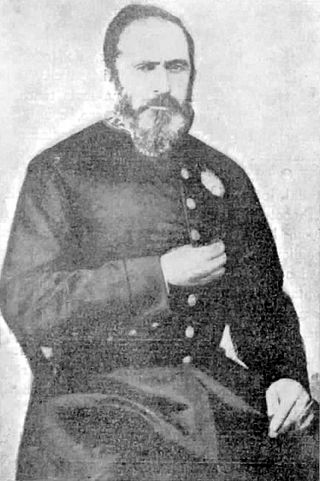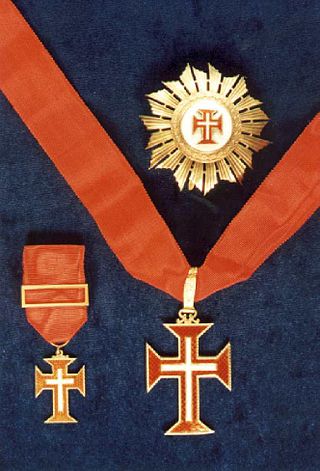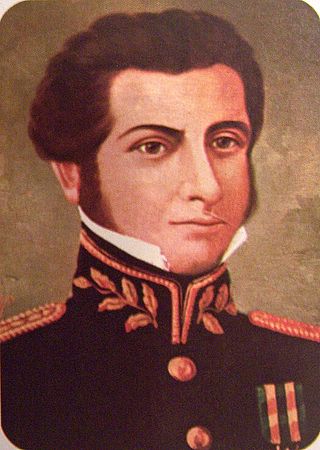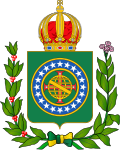Related Research Articles

Francisco José Pereira Pinto Balsemão is a Portuguese businessman, former journalist and retired politician, who served as Prime Minister of Portugal, from 1981 to 1983.
Marshal is the highest rank in both the Brazilian Army and the Brazilian Air Force, although the latter is titled marechal-do-ar. These ranks are equivalent to that of admiral in the navy. A marshal is distinguished by using five stars, which for a marshal of the air are in the approximate position of Southern Cross and for a marshal in the army, in the form of "X". The five stars of admiral are in the shape of a pentagon.

The Uruguayan War was fought between Uruguay's governing Blanco Party and an alliance consisting of the Empire of Brazil and the Uruguayan Colorado Party, covertly supported by Argentina. Since its independence, Uruguay had been ravaged by intermittent struggles between the Colorado and Blanco factions, each attempting to seize and maintain power in turn. The Colorado leader Venancio Flores launched the Liberating Crusade in 1863, an insurrection aimed at toppling Bernardo Berro, who presided over a Colorado–Blanco coalition (fusionist) government. Flores was aided by Argentina, whose president Bartolomé Mitre provided him with supplies, Argentine volunteers and river transport for troops.

Manuel Marques de Sousa, Count of Porto Alegre, nicknamed "the Gloved Centaur", was an army officer, politician and abolitionist of the Empire of Brazil. Born into a wealthy family of military background, Manuel Marques de Sousa joined the Portuguese Army in Brazil in 1817 when he was little more than a child. His military initiation occurred in the conquest of the Banda Oriental, which was annexed and became the southernmost Brazilian province of Cisplatina in 1821. For most of the 1820s, he was embroiled in the Brazilian effort to keep Cisplatina as part of its territory: first during the struggle for Brazilian independence and then in the Cisplatine War. It would ultimately prove a futile attempt, as Cisplatina successfully separated from Brazil to become the independent nation of Uruguay in 1828.

The Brazilian nobility refers to the titled aristocrats and fidalgo people and families recognized by the Kingdom of Brazil and later, by the Empire of Brazil, dating back to the early 19th century, when Brazil ceased to be a colony of the Kingdom of Portugal. It held official status until 1889, when a military coup d'état overthrew the monarchy and established the First Brazilian Republic.

José Luís Mena Barreto was an army officer, politician and monarchist of the Empire of Brazil. He came from a wealthy family with a tradition of military service. José Luís entered the army in 1836, during the Ragamuffin War, a secessionist rebellion. The conflict lasted for almost ten years, and he fought in several military engagements at that time.

Events in the year 1915 in Brazil.

Events in the year 1890 in Brazil.

Events in the year 1889 in Brazil.

Events in the year 1979 in Brazil.

The Ordem Militar de Cristo, the full name of which is the Military Order of Our Knights of Lord Jesus Christ, is a Portuguese honorific Order which takes its name from the extinct Order of Christ (1834), which is given for distinguished service in the performance of functions in sovereign positions or public administration, and for the judiciary and diplomacy, which is seen as being particularly distinguished.
This is a timeline of Portuguese São Tomé and Príncipe from its discovery between mid-January 1469 to 1471 to independence on July 12, 1975. It includes the time when the island was under Dutch and French occupations and the separate colonies of São Tomé and Príncipe up to its unification in 1753.

The Constituent Cortes of 1820, formal title The General and Extraordinary Cortes of the Portuguese Nation, also frequently known as the Sovereign Congress or the Cortes Constituintes Vintistas, was the first modern Portuguese parliament. Created after the Liberal Revolution of 1820 to prepare a constitution for Portugal and its overseas territories, it used a different system from the traditional General Cortes for choosing representatives, and the three traditional feudal estates no longer sat separately. The Cortes sat between January 24, 1821 and November 4, 1822 at the Palácio das Necessidades in Lisbon. The work of the Constitutional Cortes culminated in the approval of the Portuguese Constitution of 1822.

João Manuel de Lima e Silva was a Brazilian military officer and revolutionary leader, being the first general of the Riograndense Republic.
References
- ↑ Silva 1906b, p. 139.
- ↑ Silva 1906b, p. 155.
- ↑ Silva 1906b, p. 188.
- ↑ Silva 1906b, p. 196.
- ↑ Silva 1906b, p. 304.
- ↑ Silva 1906b, p. 315.
- ↑ Silva 1906b, p. 317.
- ↑ Silva 1906b, p. 549.
- ↑ Silva 1906b, p. 134.
- ↑ Silva 1906b, p. 148.
- ↑ Silva 1906b, p. 184.
- ↑ Silva 1906b, p. 200.
- 1 2 Silva 1906b, p. 218.
- ↑ Silva 1906b, p. 236.
- ↑ Silva 1906b, p. 293.
- ↑ Silva 1906b, p. 300.
- ↑ Silva 1906b, p. 325.
- ↑ Silva 1906b, p. 388.
- ↑ Silva 1906b, p. 415.
- ↑ Silva 1906b, p. 538.
- ↑ Silva 1906b, p. 552.
- ↑ Silva 1906b, p. 581.
- ↑ Silva 1906b, p. 585.
- ↑ Silva 1906b, p. 177.
- 1 2 São Leopoldo 1839, p. 291.
- ↑ Silva 1906b, p. 249.
- ↑ Silva 1906b, p. 267.
- ↑ Silva 1906b, p. 288.
- ↑ Silva 1906b, p. 311.
- ↑ Silva 1906b, p. 385.
- ↑ Silva 1906b, p. 531.
- ↑ Silva 1906b, p. 541.
- ↑ Silva 1906b, p. 553.
- ↑ Silva 1906a, p. 54.
- ↑ Silva 1906b, p. 151.
- ↑ Silva 1906b, p. 167.
- ↑ Silva 1906b, p. 194.
- ↑ Silva 1906b, p. 229.
- ↑ Silva 1906b, p. 322.
- ↑ Silva 1906b, p. 365.
- ↑ Silva 1906b, p. 389.
- ↑ Silva 1906b, p. 411.
- ↑ Silva 1906b, p. 418.
- ↑ Silva 1906b, p. 496.
